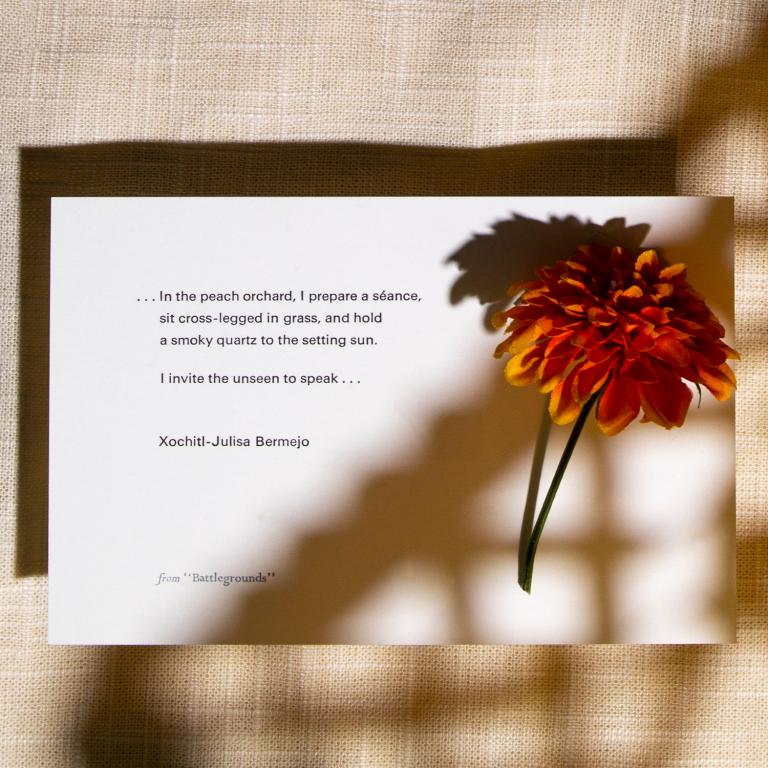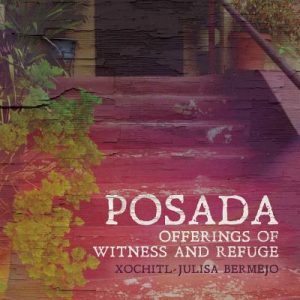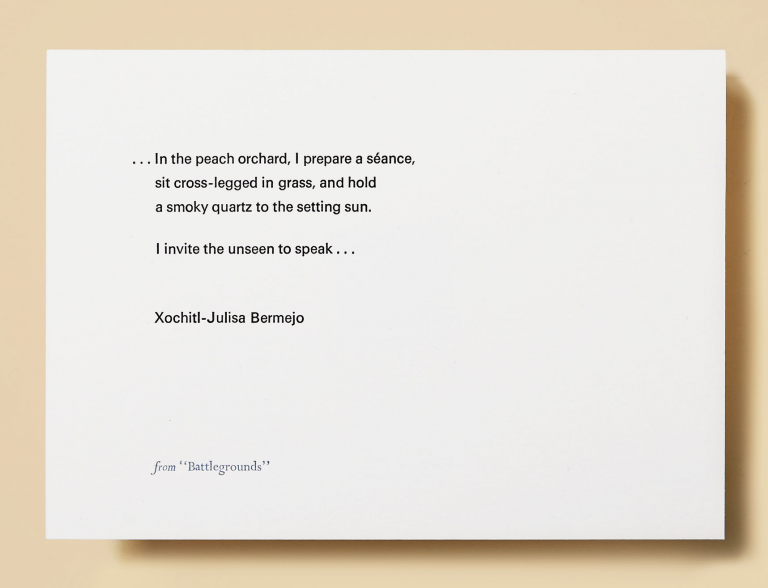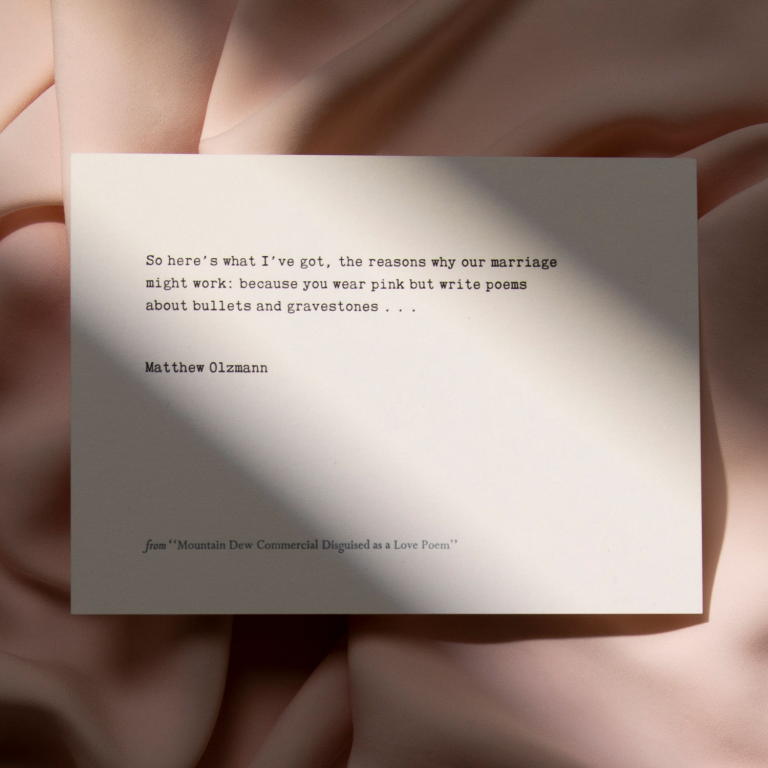Xochitl-Julisa Bermejo
Battlegrounds
This poem takes place on battlegrounds. The poet — Xochitl-Julisa Bermejo — is at Gettysburg National Military Park, where she wanders around the cemetery searching for the graves of Mexican soldiers. Instead she finds KKK books on display in the park’s visitors gift shop. So much of this poem is about unearthing, and making offerings of devotion and life: the poet makes offerings to her ancestors, but she also makes offerings of water bottles to migrants at border crossings.
Letterpress art by Myrna Keliher.

Image by Lucero Torres, © All Rights Reserved.
Guest

Xochitl-Julisa Bermejo is the daughter of Mexican immigrants and the author of Posada: Offerings of Witness and Refuge. She considers herself an experiential witness poet for today’s America, and in 2017, she was the Gettysburg National Military Park’s “Poet in the Park,” in partnership with National Parks Arts Foundation and the Poetry Foundation. Her poem, "Battlegrounds," featured in the Academy of American Poets’ Poem-A-Day series, was written during this time. A former Steinbeck Fellow, Xochitl Julisa Bermejo is the director of Women Who Submit, a literary organization fighting for gender parity in publishing.
Transcript
Pádraig Ó Tuama, host: My name is Pádraig Ó Tuama, and one of the things that was really powerful in my education was learning poems about Irish resistance to empire. And often those poems were full of sadness and even accusation. But what I was left with, in learning these poems off by heart in Irish and English as a youngster, was the fact that there is something powerful to be celebrated — that that is never an aim of vengeance on powers, but really a way of keeping something alive that needs to be kept alive.
[music: “Praise the Rain” by Gautam Srikishan]
“Battlegrounds” by Xochitl-Julisa Bermejo:
Gettysburg National Military Park
“Motorcycles and white tour vans speed
between behemoth granite shafts, shove
my body by their force, leave me roadside
and wandering fields. Little is funny
when you’re Chicana and walking
a Civil War site not meant for walking.
Regardless, I ask park rangers and guides
for stories on Mexican soldiers,
receive shrugs. No evidence in statues
or statistics. In the cemetery, not one
Spanish name. I’m alone in the wine shop.
It’s the same in the post office, the market,
the antique shop with KKK books on display.
In the peach orchard, I prepare a séance,
sit cross-legged in grass, and hold
a smoky quartz to the setting sun.
I invite the unseen to speak. So many dead,
it’s said Confederates were left to rot.
In war, not all bodies are returned home
nor graves marked. I Google ‘Mexicans
in the Civil War’ and uncover layers
to the Treaty of Guadalupe Hidalgo
and Cinco de Mayo. This is how I meet
ancestors for the first time, heroes
this country decorates in clownish sombreros
and fake mustaches, dishonors for fighting
European empire on shared American land
Power & Money dictate can’t be shared.
Years before this, carrying water gallons
up an Arizona mountain ridge to replenish
supplies in a pass known as ‘Dead Man’s,’
I wrote messages on bottles to the living,
scanned Sonoran canyons for the lost,
and knew too many would not be found.
A black Sharpie Virgen drawn on hot plastic
became a prayer: may the next officer halt
before cracking her face beneath his boot,
spilling life on to dirt. No, nothing’s funny
when you’re brown in a country you’re taught
isn’t yours, your dead don’t count.”
[music: “White Filament” by Blue Dot Sessions]
I first came across this poem when it was poem of the day from poets.org — there’s a daily email you get. I love those daily offerings. Some of the people, I’m familiar with their work, and others, I’m not yet familiar with their work. And what moved me so much in the poem was the plight of it — how to honor the dead and, especially, how to honor the dead who have been perhaps deliberately forgotten or unnamed or left out of memory. In all cultures, there’s processes to honor the dead — their name, their body, their burial or memorial place. And this poem is a lamentation for the lack of such honor to the dead, and even more, the deliberate lack of such honor for the dead, because of policy and decision and empire. And because of prevailing narratives, certain people’s deaths aren’t narrated.
[music: “Flor Vjell” by Blue Dot Sessions]
So this poem has two locations and two times. The first location is a Civil War site. Xochitl-Julisa Bermejo wrote this poem while she was poet in residence with the National Parks Arts Foundation and the Poetry Foundation, for a month in 2017. And so the poem is written at the Gettysburg National Military Park in Pennsylvania. And she’s on roads and in the shops and a peach orchard. And then the second location goes back in time a little, to a few years previous, when she was in an Arizona mountain ridge, a ridge named Dead Man’s Ridge, And she’s replenishing supplies of water for anyone who is in need of water while they’re crossing the Mexican-American border, there in Arizona.
So those are the two locations particularly, but then there’s two times, as well. There’s the time right now, and I think it’s extraordinary, how contemporary this poem is. The syntax, the vocabulary in this poem is so current — motorcycles, tour vans, rangers, park guides, statues and statistics, wine shop, the post office and markets, even antique shops — we’ll come back to that — Google, there’s a smartphone being used, and then “clownish sombreros” and plastic bottles and Sharpies and officers. All of these things are speaking to a very contemporary climate.
But there’s the past, as well — Civil War site, stories about Mexican soldiers, the cemetery with certain dead bodies, but no Spanish names, and war and the bodies of soldiers, including those Confederates left to rot. And then there’s the Treaty of Guadalupe Hidalgo, and Cinco de Mayo.
And so both of those are experiences in Mexican history. The Treaty of Guadalupe Hidalgo is the treaty of 1848, formally called the Treaty of Peace, Friendship, Limits, and Settlement, between the United States of America and the Mexican Republic. And Cinco de Mayo, May 5, marks the victory of Mexican armies over the French, from 1862. And so you’ve got real historical references happening, as well as contemporary references happening, and two particular places: a Civil War site, as well as borderlands.
[music: “Memoriam” by Gautam Srikishan]
There’s an extraordinary contrast in this poem, which I love, between the antique shop and the séance. The antique shop opens a doorway, and lots of people like antique shops because, in a certain sense, it’s a commemoration of the past and it’s a way of heritage. But what she’s highlighting here is that the antique shop opens the doorway to the past through stories of the KKK, rather than amplifying other stories. And that’s a powerful critique in this poem — how are you looking to the past, and through which doors?
And in the séance, she opens up other doors to the past, using a quartz — something both present and old; and she invites the unseen to speak. Who are these unseen? I think they’re ghosts, yes, but they’re also the unseen in terms of history books, the people whose names are not commemorated. You can’t see their names on the gravestones; in any of the official commemorations, their narrative isn’t spoken. And so she’s meeting ancestors in their own integrity here and critiquing, really, the curated version of telling a certain scandalous past, but in a way that is nonetheless still amplifying it through KKK books in an antique store, and what she’s doing, which is opening up séance and opening up stories of the past, to hear the past speaking for itself.
[music: “Memoriam” by Gautam Srikishan]
The image toward the end of the poem, where she remembers a few years previously having walked Sonoran canyons and leaving bottles of water with an image of the Virgen, the Virgin, drawn on them — that opens up a possibility for the present leading into the future. So, while this poem is about two places and the past and the present, the image of water is like an offering to the future, a literal offering that might keep somebody alive.
And I think this story of this poem invites the reader to consider the stories of the country you love and what stories, whether of the past or the present, show the underbelly of our national narratives. What’s really important to notice in this poem is that this poem doesn’t have any vengeance.
Often, when I’ve been in situations where you’re trying to work with groups of people who are reckoning with the pasts of their own country, you can hear a reaction — someone, maybe from a European background, saying, “So what? Do you want me to deny my past, and all European people should go back to Europe?”
And that exaggeration shows more fear than anything. And this poem isn’t saying that. This poem is saying, very simply and very powerfully: The dead need to be honored, and the living need to be kept living — let’s tell stories that help both. And I think the poem, by doing this, by doing the telling of the past, and also, by offering water as a sacred gift that keeps someone alive, this is showing a profound hopefulness in this poem to say, look at what’s possible.
[music: “Memoriam” by Gautam Srikishan]
“Battlegrounds” by Xochitl-Julisa Bermejo:
Gettysburg National Military Park
“Motorcycles and white tour vans speed
between behemoth granite shafts, shove
my body by their force, leave me roadside
and wandering fields. Little is funny
when you’re Chicana and walking
a Civil War site not meant for walking.
Regardless, I ask park rangers and guides
for stories on Mexican soldiers,
receive shrugs. No evidence in statues
or statistics. In the cemetery, not one
Spanish name. I’m alone in the wine shop.
It’s the same in the post office, the market,
the antique shop with KKK books on display.
In the peach orchard, I prepare a séance,
sit cross-legged in grass, and hold
a smoky quartz to the setting sun.
I invite the unseen to speak. So many dead,
it’s said Confederates were left to rot.
In war, not all bodies are returned home
nor graves marked. I Google ‘Mexicans
in the Civil War’ and uncover layers
to the Treaty of Guadalupe Hidalgo
and Cinco de Mayo. This is how I meet
ancestors for the first time, heroes
this country decorates in clownish sombreros
and fake mustaches, dishonors for fighting
European empire on shared American land
Power & Money dictate can’t be shared.
Years before this, carrying water gallons
up an Arizona mountain ridge to replenish
supplies in a pass known as ‘Dead Man’s,’
I wrote messages on bottles to the living,
scanned Sonoran canyons for the lost,
and knew too many would not be found.
A black Sharpie Virgen drawn on hot plastic
became a prayer: may the next officer halt
before cracking her face beneath his boot,
spilling life on to dirt. No, nothing’s funny
when you’re brown in a country you’re taught
isn’t yours, your dead don’t count.”
[music: “Praise the Rain” by Gautam Srikishan]
Lily Percy: “Battlegrounds” comes from Xochitl-Julisa Bermejo’s chapbook, Locating the Dead. Thank you to Xochitl, who gave us permission to use her poem. Read it on our website, at onbeing.org.
[music: “Praise the Rain” by Gautam Srikishan]
Poetry Unbound is: Gautam Srikishan, Chris Heagle, Erin Colasacco, Eddie Gonzalez, Lilian Vo, and me, Lily Percy.
Our music is composed and provided by Gautam Srikishan and Blue Dot Sessions. This podcast is produced by On Being Studios, which is located on Dakota land.
We also produce other podcasts you might enjoy, like On Being with Krista Tippett, Becoming Wise, and This Movie Changed Me. Find those wherever you like to listen, or visit us at onbeing.org to find out more.
Books & Music
Recommended Reading
The On Being Project is an affiliate partner of Bookshop.org and Amazon.com. Any earnings we receive through these affiliate partnerships go into directly supporting The On Being Project.










Reflections